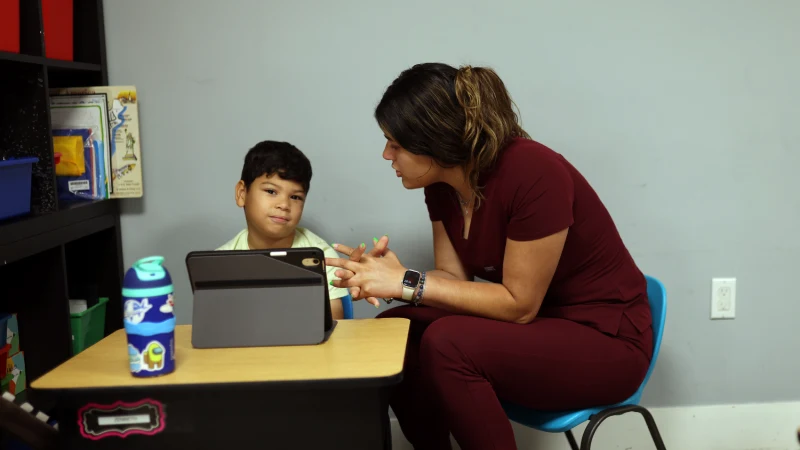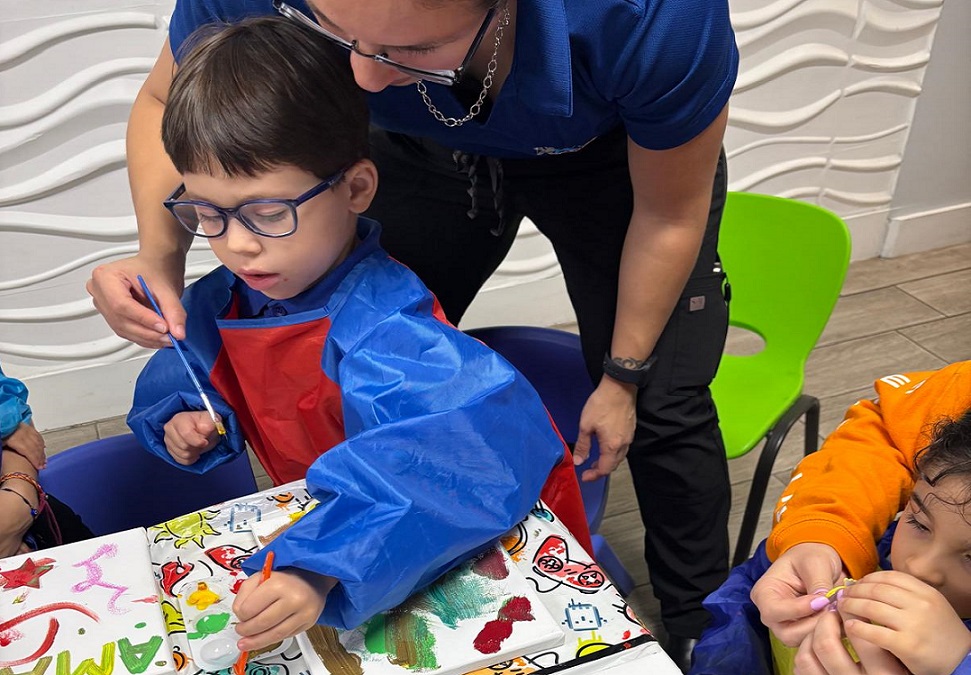Autism Spectrum Disorder (ASD) is a developmental condition that affects communication, behavior, and social interaction. However, over the years, understanding of ASD has evolved significantly, allowing more people to access accurate diagnoses and appropriate support strategies.
To put it in perspective, 1 in 6 children is diagnosed each year in the United States with a neurodevelopmental condition, including ASD. Still, there are many doubts, taboos, and misinformation about what autism truly is, how it manifests, and how to support those who experience it.
That’s why this article aims to shed light on autism spectrum disorder by explaining its symptoms, causes, and characteristics, as well as the best ways to support students with ASD and their families in future educational environments.
What is Autism Spectrum Disorder (ASD)?

Autism spectrum disorder is a neurological developmental condition that affects how a person interacts with the world. It’s important to understand that ASD is a spectrum, which means its manifestations can vary widely. Some individuals may have more difficulties than others with communication and behavior.
Fortunately, science has made strides in understanding autism, leading to improved diagnoses and intervention strategies in specialized centers. ASD is now recognized as a unique way of perceiving, interacting, and communicating with the world, which can influence the everyday life of those affected.
Here are some key points to better understand this condition:
- It’s a broad spectrum: Not all individuals with ASD exhibit the same autism spectrum symptoms or the same level of severity.
- It affects communication and social interaction: Many individuals with ASD struggle to interpret social norms or express their emotions.
- Presence of repetitive behaviors and sensory sensitivity: Repetitive behaviors, such as rocking or repeating words, may be observed.
- No single defined cause: While a combination of genetic and environmental factors is suggested, no specific origin has been identified.
- Early detection is key: Timely diagnosis allows access to therapies and resources that improve quality of life.
- Diversity within the spectrum is valuable: ASD is not a disease and should not be seen as something to be “fixed.”
What Are the Symptoms of Autism Spectrum Disorder?

We now understand that autism spectrum disorder manifests uniquely in each person, so signs and symptoms of autism can vary in intensity and expression. People with autism often show distinct patterns in behavioral interests or activities. However, there are common patterns that support early identification and diagnosis.
Understanding these symptoms is key to providing proper support and promoting inclusion for individuals on the autism spectrum. ASD affects diverse and important areas of development and behavior, and symptoms can appear as early as infancy. The most common symptoms include:
Difficulties in verbal and nonverbal communication:
- Some individuals with ASD experience language delays or struggle to maintain fluid conversation.
- They may not understand gestures, body language, facial expressions, or tone of voice.
- In some cases, they may repeat words or phrases (echolalia).
Altered social interaction:
- Difficulty interpreting social rules, such as eye contact or turn-taking in conversation.
- Preference for solitude or limited interaction with others.
- Trouble understanding others’ emotions and expressing their own.
Restricted interests and repetitive behaviors:
- Intense focus on specific topics or activities, showing deep dedication and knowledge.
- Repetitive movements, such as rocking, clapping, or spinning.
- Need for strict routines and resistance to change.
Increased or decreased sensory sensitivity:
- Unusual responses to stimuli like bright lights, loud noises, or certain textures.
- May show hypersensitivity or lack of sensitivity to pain and other physical sensations.
- Specific food preferences due to smell or texture.
Emotional regulation difficulties:
- Intense emotional reactions to situations that may seem minor to others.
- Difficulty handling frustration and unexpected changes.
- May engage in self-stimulatory or self-injurious behaviors.
Uneven skill development:
- Some individuals with ASD may show exceptional abilities in areas like math, music, or memory.
- However, they may struggle with everyday tasks that require social or motor skills.
- Levels of early development and independence vary widely within the spectrum.
How is Autism Spectrum Disorder Diagnosed?

Each individual with ASD has a unique set of strengths and challenges, as well as a singular way of perceiving the world. There is no specific medical test to identify autism. Instead, healthcare professionals conduct a thorough evaluation based on the person’s behavior, development, and medical history.
Early detection of ASD is essential to ensure access to the right support, improve quality of life, and foster the development of skills that support social integration. Diagnosis involves several clinical assessments and observations, which may include:
Developmental evaluation and behavioral observation:
- Child development specialists observe the child’s behavior in different settings to identify potential ASD signs.
- They analyze communication, social interaction, language, and responses to external stimuli.
- Direct observation and reports from parents and teachers are essential to detect consistent patterns.
Use of standardized tools:
- There are specific tests and questionnaires designed to evaluate ASD symptoms.
- These tools measure the frequency and intensity of behaviors associated with the spectrum.
- These tests must be administered by trained professionals.
Review of family and medical history:
- The child’s medical history is reviewed, including genetic factors, prenatal complications, and associated neurological conditions.
- Reviewing family history may help detect potential hereditary predispositions.
- Other medical conditions that could affect development may also be ruled out.
Multidisciplinary evaluation:
- Pediatricians, neurologists, psychologists, and speech and occupational therapists collaborate to make an accurate diagnosis.
- They evaluate cognitive development, motor skills, communication, and social adaptation.
- Involving multiple specialists allows for a comprehensive understanding of the child’s needs.
Differential diagnosis:
- It is important to distinguish ASD from other developmental disorders, such as Attention Deficit Hyperactivity Disorder (ADHD).
- Accurate diagnosis avoids confusion and supports effective intervention planning.
- Each case should be assessed individually to understand the complexity of the autism spectrum.
How to Help Students with Autism Spectrum Disorder?

It’s natural for every parent to want their child to receive the right education. However, students with autism spectrum disorder may face unique challenges in school, especially regarding socialization and adapting to changes. With the right strategies, learning can be fostered and integration can be improved.
The key is understanding their individual needs and adopting educational methods that respect their unique way of processing information. To ensure an inclusive and accessible educational environment, specific strategies must be implemented. Here are some effective forms of educational support:
Adapting the learning environment:
- Reduce visual and auditory distractions to avoid sensory overload.
- Provide quiet spaces where students can regulate their emotions.
- Use adapted materials such as images, sounds and visual aids.
Promoting communication and socialization:
- Implement alternative communication methods, such as visual support systems or assistive technology.
- Teach social skills through structured games and guided activities.
- Encourage peer interaction through inclusive group settings.
Establishing routines and clear structure:
- Set predictable schedules and activities to reduce anxiety.
- Use visual supports such as illustrated agendas to explain daily tasks.
- Introduce changes gradually and explain them clearly in advance.
Using personalized teaching methods:
- Adapt content based on the student’s strengths and preferences to enhance learning.
- Incorporate special interests into lessons to boost attention and motivation.
- Encourage multisensory learning through diverse materials and strategies.
Fostering autonomy and practical skills:
- Teach self-regulation strategies to help students manage emotions and stress.
- Provide tools for problem-solving and decision-making.
- Reinforce independence in everyday school activities.
Training and raising awareness among school staff:
- Offer training to teachers and staff about ASD and its characteristics.
- Promote an inclusive approach in the classroom, fostering respect and understanding among all students.
- Maintain open communication with families to coordinate strategies and support.
Koala ABA & Learning Centers: Early ASD Evaluation and Diagnosis.

At Koala ABA & Learning Centers, we understand that Autism Evaluation is a crucial process designed to identify and understand the unique characteristics and challenges experienced by children with autism spectrum disorder. Our evaluations are conducted by a team of professionals, including psychologists, pediatricians, speech-language pathologists, and occupational therapists.
Koala ABA & Learning Centers is dedicated to performing thorough psychological and educational assessments for individuals suspected of having ASD. We recognize the uniqueness of every autism journey, and our evaluations are carefully tailored to the child’s age and specific concerns.
Some benefits of our early childhood diagnosis process include:
- Early Intervention: Once the diagnosis is confirmed, we offer ABA Therapy, Speech Therapy, and Occupational Therapy.
- Access to Services: An autism diagnosis is often a prerequisite for accessing services like ABA Therapy and Special Education.
- Parent Education and Support: Early diagnosis empowers parents with knowledge and tools to address their child’s needs.
Contact us today and discover how our programs support your child’s special needs by addressing communication, language, and social functioning. Don’t wait—let’s build a better future for them, starting now!




